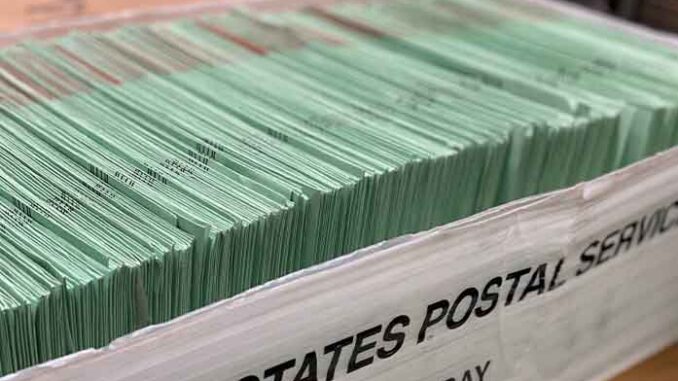
The Arizona Court of Appeals has agreed to weigh in on whether Cochise County and the state’s 14 other counties have authority to expand the hand count audit of ballots tabulated by machine beyond the small percent of ballots currently being audited.
A three-judge appellate panel will hear oral arguments on July 18 in Tucson in a challenge by the Cochise County Bboard of Supervisors to judge’s order issued the day before the November 2022 General Election which barred county officials from conducting an expanded hand count audit of ballots cast in the election.
Arizona law requires all ballots cast in an election -whether as early ballots, in-person ballots, or from overseas voters- be tabulated by machine if the county opts to use an electronic elections management system. It is the results obtained by machine tabulation that are canvassed by the county board and reported to the Arizona Secretary of State.
To instill public confidence in machine ballot tabulation, Arizona Revised Statute 16-602 contains one process under 16-602(B) to manually audit ballots cast at precincts / voting centers on Election Day. Another process is outlined in 16-602(F) an audit of early ballots.
Both processes, however, result in the audit of only a very small percentage of overall ballots cast in each county.
In October 2022, the Cochise County board voted to conduct a hand count audit under ARS 16-602(B) “of all County precincts for the 2022 General Election to assure agreement with the voting machine count.” The vote was based in part on an opinion provided by then-Arizona Attorney General Brnovich’s office that Cochise County had discretion to conduct such a hand count.
The opinion also noted the county had discretion to hand count audit all early ballots.
The expanded hand count audit vote triggered a lawsuit by the Arizona Alliance for Retired Americans and one of its members who resides in Cochise County. The Cochise County defendants, which include the board of supervisors and County Recorder David Stevens, argued ARS 16-602 puts forth only “the bare minimum” requirements for a county to follow during a hand count audit.
Judge Casey McGinley of the Pima County Superior Court went on to issue an order prohibiting the planned expanded audit under 16-602(B) or under 16-602(F). The county board appealed in February.
Then in May, current Attorney General Kris Mayes announced a 180 degree flip from the expanded hand count audit opinion issued by her predecessor. The new opinion states the Brnovich-era opinion “mistakenly concluded” that Cochise County any had authority to deviate from 16-602 in any manner.
What weight, if any, the Court of Appeals will place on Mayes’ new opinion is unclear, as it refers to the same ruling by McGinley now under appellate review.
But one issue which may impact the judges is the unprecedented problems experienced in Pinal County during the 2022 General Election.
A subsequent recount in December of two statewide races led to the public disclosure that hundreds of valid, lawful ballots were not tabulated in Pinal County in November.
The problem was not caught during a Nov. 11 hand count audit, which involved less than 420 of the county’s roughly 35,600 Election Day ballots and only 1,041 of more than 103,000 early ballots cast.
Attorneys Alex Kolodin and Veronica Lucero of Scottsdale-based Davillier Law Group are representing Stevens in the expanded hand count audit lawsuit, while the supervisors have contracted Bryan Blehm.
It is Blehm who filed a lawsuit on Nov. 14 against then-Cochise County Elections Director Lisa Marra in both her official capacity and on a personal basis for her refusal to participate in the county board’s plans for an expanded audit.
Marra’s took her position based on advice from Cochise County Attorney Brian McIntyre. Blehm withdrew the lawsuit two days later after questions arose about whether the two supervisors named as plaintiffs violated state law for authorizing legal action outside of a properly noticed meeting.
Marra later resigned and received a $130,000 settlement from the county, which was paid by the Arizona Counties Insurance Pool.
However, the county’s general fund is covering the legal costs associated with the hand count audit lawsuit. This includes Blehm, Davillier Law, and the AARA’s attorneys who were awarded nearly $90,000 by McGinley for prevailing in the lawsuit.
As the Cochise County defendants await the oral arguments hearing, various counties are considering whether to -and how to- transition away from tabulating ballots by machine. One issue is that there is no audit provision in Arizona law to ensure a manual vote count is itself correct.
Mohave County and Pinal County have taken some steps to look at options for manual tabulation. However, Pinal County stopped the activity earlier this month in order to confer with Secretary of State Adrian Fontes.
READ MORE
100 Percent Hand Count Plan Exposes Misinformation And Confusion
